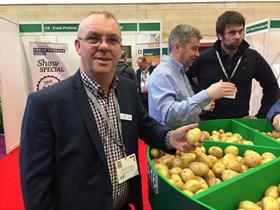
Greenvale is investing heavily in new organic potato varieties as it looks to address a shortage in reliable, high-yielding organic potatoes.
The producer and breeder, which claims to be the UK’s largest supplier of fresh organic potatoes, wants to support retailers as they try to grow this area of the market.
It is looking to develop more hardy varieties than the Dutch and German potatoes currently on offer, which, according to technical and seed director Paul Coleman, “don’t produce a very big plant”.
“Most of the breeders manage to breed in reasonable field blight resistance but what we tend to find, particularly with the European varieties from Dutch and German breeders, is that they’re much weaker than the traditional UK-bred varieties,” he said.
“Although they’ve got blight resistance, they don’t produce a very big plant because there’s not enough nitrogen there in the organic soil.”
Despite his determination to address this situation and bring through more reliable varieties, Coleman is under no illusions when it comes to the challenges that growers face, or the limited revenues that organic production can offer.
“Organics only account for about three to four per cent of potato sales at the moment,” he said. “It’s not a very big market and effectively it’s almost a service to the retailers to support all the other things we do.
“The supermarkets want an organic offering so you’ve got to be able to provide that. You’re not going to get rich on organics – in fact, you’re probably going to lose money – but it’s part of the overall range and you don’t make money across the whole piece.”
Greenvale is working closely with a number of growers to make organic potato production “as good as it possibly can be” at a time of renewed interest in the sector.
During the recession, organic breeding went into decline and little attention was paid to breeding specifically organic varieties, but now there’s a renewed focus on organic R&D, Coleman said.
Despite this, Coleman accepted that it will be “impossible” to produce achieve big profits with organics due to the significantly higher cost of production.
“Organic potatoes are a real challenge because generally customers will pay a 20 per cent premium for organics over conventional, but you can’t produce organic potatoes for that,” he explained.
“It’s impossible because the yields, the waste levels and the low fertility are much more challenging, so that then affects margins through the supply chain.”
One variety, currently in its first year of trials at Greenvale, is the sister of an existing organic potato called Sorrento.
The new variety, which has not yet been named, is similar to Sorrento in that it has strong field blight resistance and delivers high yields under low fertility, but its dry matter is slightly lower.
“We’ve decided to bring this one on to see if it suits the consumer palate a bit better,” Coleman said.
A decision on whether to release the variety is expected in June 2019.



